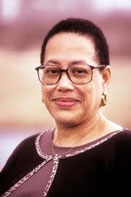
Blacks still getting fewer home mortgages
By Charlene Crowell NNPA Columnist
When it comes to assessing the nation’s housing industry, one key measure that all housing industry stakeholders take note of is the annual Home Mortgage Disclosure Act report, commonly referred to as HMDA. Nationwide, mortgage lenders are required to report a wealth of data on mortgage applications, originations and denials. These public data also include the racial composition of these key metrics.
For communities of color, it is particularly notable that the HMDA report quantifies by race and ethnicity mortgage lending and denials for both private loans, also referred to as ‘conventional’ loans and government-sponsored mortgages that are sometimes referred to as ‘non-conventional’ loans.
For 2013, the most recent figures available, the data clearly reveals that while conventional mortgage originations rose slightly from 2012 to 2013, nationwide Black consumers received only 2.3 percent or 36,903 loans. In 2012, the same data point was even smaller, with only 26,500 such loans.
To add some context to this low number of private, conventional mortgages, consider that the Chicago suburb of Calumet City with a population of 37,240 is larger than the number of loans made to the nation’s Black homebuyers last year.
Similarly, in refinance mortgage lending, Black borrowers received only 191,004 – only 4.4 percent of more than 4.3 million last year. This comparatively low level of lending continues a trend that began following the nation’s housing crisis.
Instead of gaining access to private sector mortgage lending, the vast majority of loans made to Black consumers came through government-backed programs such as VA and FHA. These programs comprise a smaller share of the overall market in 2013 compared to 2012. In 2013, Black homebuyers utilized these loans at a rate of 70.6 percent, followed by Latino purchases at 62.8 percent, while White borrowers participated at a rate of 35.3 percent.
“This enduring trend of underserving key segments of the population is deeply disturbing,” said Nikitra Bailey executive vice president of the Center for Responsible Lending (CRL). “As the slow housing recovery demonstrates, there is a market imperative to ensure that African-Americans, Latinos, and middle class families have access to mortgages in both the public and private sectors of the market. The market cannot fully recover without them.”
Other consumer advocates expressed similar concerns.
“Certainly people of color right now don’t feel like the mortgage market is a place they’re wanted,” Julia Gordon, director of housing finance and policy at the Center for American Progress told Bloomberg News. “They’ve heard the coded speech about certain groups not being ready for homeownership.”
Today, some housing industry stakeholders argue that low levels of lending to Black consumers and other low-wealth consumers is because of increased consumer protections now required in mortgage lending.
However, the new protections represent a much-needed, common sense approach. They are designed to protect borrowers from facing a repeat of the abuses that caused the recent foreclosure crisis. These new standards, enacted earlier this year, also require lenders to determine a borrower’s ability to repay their mortgage, eliminate loan steering and crack down on broker kickbacks in mortgage lending.
Actual lending experiences have proven that if lenders use responsible underwriting standards, many low-to-moderate income borrowers, regardless of race, have become successful homeowners with affordable home loan payments at fixed rates. These borrowers also gain the financial benefit of building wealth through homeownership.
For example, the Community Advantage home loan program offered by Self-Help, CRL’s parent organization, provides home loans with fair terms and reasonable rates. As a nonprofit, community financial development organization, Self-Help served these borrowers who were then unable to succeed in their loans and build wealth — even during the Great Recession.
America’s families of modest means may be short on financial assets; but there is nothing short about their hopes for their American Dreams. Our nation is big enough and broad enough to preserve these dreams for this and future generations.




Be the first to comment